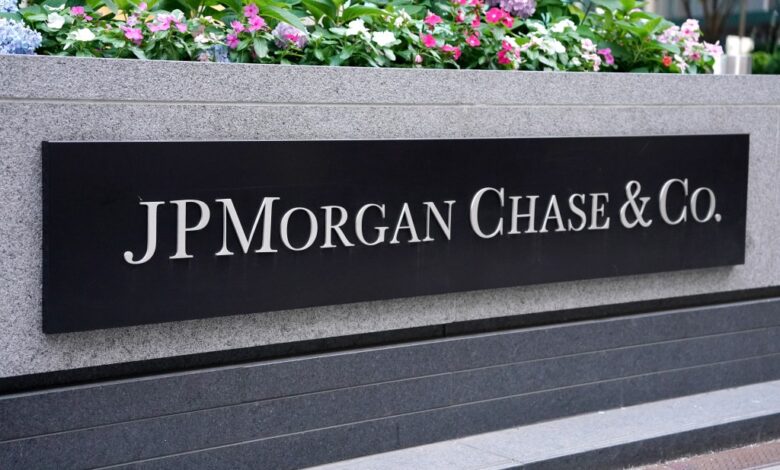JP Morgan CEO Jamie Dimon’s retirement is getting closer – and the succession plan is anyone’s guess

One of the biggest questions involving JP Morgan, the nation’s biggest and most prestigious bank, involves succession planning: When will its long time CEO, the king of all banking, Jamie Dimon, step down.
Last week, he gave some clues. It’s “not five years anymore,” he said during JP Morgan’s investor day without elaborating.
Thanks for that, Jamie. Good thing The Post is here to suss out what is going on inside the C-suit at JPM, and we can report, with a fair degree of confidence, that Dimon is signaling he’s out in about two, maybe three years, after he turns 70 years old.
What he does next is, well, anyone’s guess.
Even the very hint of a Dimon retirement from JPM caused markets to react. Shares tanked about 4%, and still haven’t fully recovered as this column goes to press. One reason is Dimon’s stature in banking earned by his success rate. Despite a few blips on the regulatory radar — the London Whale, JPM’s continued business dealings with miscreants like Bernie Madoff and Jeffrey Epstein — Dimon has been among the most successful investment executives of our generation. Unlike other big banks, there have been no big scandals, at least not lately, and shares are up 89% over the past five years.
“He works every day, seven days a week. He’s in all the major meetings, he’s managing risk and selling stuff,” is how one JPM executive explained Dimon’s work ethic. “He has no hobbies and he loves his job. Can’t imagine what he will do in retirement.”
The executive also can’t imagine who can fill his proverbial shoes, and neither can most investors in the stock. They see what most people inside the bank see: A strong CEO who built a fortress balance sheet and business model leaving the keys to the kingdom to the B team.
OK, that might be a bit harsh since all of the front runners have successfully run major business lines, even if it’s the current mood of the Dimon-watching crowd on Wall Street. Dimon has set up a three-way race among consumer-banking chief Marianne Lake, co-head of JPM’s investment and commercial bank Jennifer Piepszak, and Troy Rohrbaugh, the other commercial and investment bank co-CEO. Not exactly Wall Street household names, but for the moment Dimon is playing the hand that he’s got. Edge goes to Lake, I am told, because she also served as JPM’s CFO and is said to be the best at managing risk.
Reelin’ in the years

So why is he doing it now? Dimon, as far back as anyone can remember, kept giving his retirement date a five-year time span; yes, for some reason, retirement has always been five years away, until apparently, last week.
My sources cite several reasons for Dimon’s mood swing. First there’s the example of James Gorman, the now-retired CEO of Morgan Stanley. Gorman had an equally impressive run as CEO and left the company in great shape after setting up a carefully planned horse race between two of his top executives. Gorman left the CEO suite in January and on Thursday, Gorman said he’ll step down as chairman at the end of the year.
Dimon is said to have marveled at the succession process. The hand-picked favorites, Ted Pick, the head of his institutional business that oversees risk, and Andy Saperstein, the brokerage chief, were under strict orders simply to do their jobs and not lobby the board or him. Let the results speak for themselves.
Both did exactly that and Pick came out the winner. Saperstein, a valued member of Gorman’s inner circle, remains at the firm because of the seamless nature of the process. There wasn’t the normal type of bloodletting that goes down when the C-suite changes. Morgan Stanley’s stock is up about 20% over the past year, largely keeping track with the massive rally in the S&P.
Plus, Dimon knows he’s had a good run and has seen his fair share of CEO types stay on well past their prime. Recall how Dimon was defenestrated from Citigroup in a management tussle with Sandy Weill back in the day. He spent a few years in the wilderness and eventually landed at a regional lender, Banc One. In 2004, he merged it into JPM following its merger with Chemical Bank, which had merged with the old Chase Manhattan Corp.
Dimon became CEO and found himself at the top of a Wall Street Investment banking empire that would surpass Citigroup in size and stature. Weill, of course, is long gone. Citigroup would soon face the ignominy of regulatory scandals, reckless risk-taking and numerous bailouts during the 2008 financial crisis, while Dimon earned his king-like status successfully navigating JPMorgan through the mess.
So what does Dimon do next? That depends on whom you speak to. Some people inside JPM say they think he will teach at the university level. Friends who go back to his Citigroup days tell me he hasn’t given up hopes on running for national office. Remember when he said he could be a better president than Donald Trump because he’s “smarter” and “as tough” as Trump is? Dimon later apologized but no one doubts that’s how he really feels.
The most likely scenario for my money, offered by one JPM exec, is that Dimon doesn’t stray far. JP Morgan’s new Midtown Manhattan HQ is scheduled to open in the next two years and he’d love to do the groundbreaking. That’s why he retires as CEO and stays at JPM as chairman, and lets Lake & Co., do the heavy lifting for some time while he sets the strategic direction and does what he really likes to do: Come to work every day.




